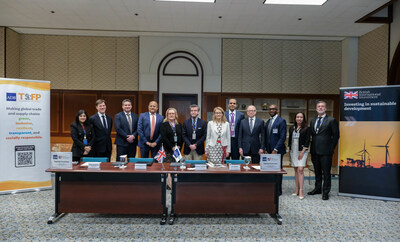Fintech PR
BII and ADB Trade and Supply Chain Finance Program sign $100m risk sharing agreement to promote green trade in Asia, including Vietnam

- BII and ADB forge partnership to increase access to finance to facilitate trade of green goods
- The risk sharing agreement will help international banks increase financing support to local banks in South and South East Asia, starting off in Vietnam
- The collaboration addresses demand for longer-tenor finance to support climate related projects particularly within the renewable energy sector
HANOI, Vietnam, Jan. 18, 2024 /PRNewswire/ — British International Investment (BII), the UK’s development finance institution (DFI) and impact investor, and Asian Development Bank (ADB), the regional development bank for Asia and the Pacific, today announced a new partnership to finance up to $100 million of green trade transactions in the region. The partnership will be managed through ADB’s Trade and Supply Chain Finance Program (TSCFP) and will focus on renewable energy, energy efficiency and climate-smart agriculture to support the region’s energy transition and climate resilience.
In South and South East Asia, two of the most vulnerable regions to climate change, enabling development of more renewable energy capacity and its supply chain is essential to achieve the region’s sustainability goals.
Trade is a critical part of this as it enables the flow of goods that help regions to mitigate and adapt to the impacts of climate change. However, it is estimated that there is a global trade finance gap of $2.5 trillion annually, which means businesses lack access to the finance needed to trade energy transition goods for climate projects. Furthermore, local banks are currently not able to fully meet the demand to provide longer tenors required to finance goods for climate related projects, particularly within the renewable energy sector.
The BII-ADB partnership aims to reduce the global trade finance gap and address this unmet demand for longer tenor for green transactions. The risk sharing agreement between the two organisations will help international banks increase their financing support to local banks, initially in Vietnam, before expanding to other countries supported by BII and ADB.
This will provide crucial financing for local importers of solar panels, wind turbines, electric vehicles, and agricultural goods which will support the region to transition to cleaner sources of energy.
Andrew Mitchell, UK Minister for Development and Africa, said: “This agreement between BII and the Asian Development Bank will unlock crucial green trade finance in Asia. It demonstrates how, by working together, the development finance system can mobilise the private finance so urgently needed to support countries in their transition to low carbon, climate-resilient economies.”
Srini Nagarajan, Managing Director and Head of Asia at BII, commented: “Supporting sustainable development in South and South East Asia is a key priority at BII. Green trade finance enables supply chain development of the renewable energy industry and tackles the bottleneck for much needed long tenor financing in the region. We are delighted to work with ADB, a strong partner with extensive knowledge and network in Asia, on a shared ambition to support the region’s energy transition and build climate resilience.”
Suzanne Gaboury, Director General for Private Sector Operations at ADB, said: “This collaboration with BII will strengthen ADB TSCFP’s capacity to further grow green supply chains in Asia-Pacific region, with a focus on energy transition goods that are essential for tackling climate change.”
The BII-ADB Green Trade Finance Facility supports SDG 7 on Affordable and Clean Energy and SDG 13 on Climate Action. The transaction is led by Freddie Tucker, Investment Director, Trade and Supply Chain Finance at BII.
Notes to editors:
About British International Investment
- British International Investment is the UK’s development finance institution and impact investor.
- British International Investment is a trusted investment partner to businesses in Africa, Asia and the Caribbean.
- It invests to support the UK Government’s Clean Green Initiative and to create productive, sustainable and inclusive economies in our markets.
- Between 2022-2026, at least 30 per cent of BII’s total new commitments by value will be in climate finance.
- BII is also a founding member of the 2X Challenge which has raised over $16 billion to empower women’s economic development.
- The company has investments in over 1,470 businesses across 65 countries and total assets of £8.1 billion.
- For more information, visit: www.bii.co.uk | watch here.
- Follow British International Investment on LinkedIn and X.
About Asian Development Bank’s Trade and Supply Chain Finance Program
- The Asian Development Bank (ADB) supports projects in developing member countries that create economic and development impact, delivered through both public and private sector operations, advisory services, and knowledge support.
- TSCFP works to make global trade and supply chains green, resilient, inclusive, transparent, and socially responsible.
- TSCFP empowers countries to meet the Sustainable Development Goals by closing market gaps through guarantees, loans, and knowledge products.
- Since 2009, the TSCFP has supported $57 billion in trade across 45,510 transactions (60 per cent SME-related).
- In addition to delivering guarantees and loans to close trade finance gaps, ADB’s Trade and Supply Chain Finance Program (TSCFP) has a history of delivering transformative initiatives: ADB’s Global Trade Finance Gaps Study; The ICC Trade Register; Deep-Tier Supply Chain Finance White Paper; Digital Standards Initiative.
- For more information, visit: https://www.adb.org/what-we-do/trade-supply-chain-finance-program.
- Follow ADB TSCFP on LinkedIn.
Photo: https://mma.prnewswire.com/media/2320504/British_International_Investment_1.jpg
Photo: https://mma.prnewswire.com/media/2320503/British_International_Investment_2.jpg
![]() View original content to download multimedia:https://www.prnewswire.co.uk/news-releases/bii-and-adb-trade-and-supply-chain-finance-program-sign-100m-risk-sharing-agreement-to-promote-green-trade-in-asia-including-vietnam-302037184.html
View original content to download multimedia:https://www.prnewswire.co.uk/news-releases/bii-and-adb-trade-and-supply-chain-finance-program-sign-100m-risk-sharing-agreement-to-promote-green-trade-in-asia-including-vietnam-302037184.html

Fintech PR
President Emmerson Mnangagwa met this week with Zambia’s former Vice President and Special Envoy Enoch Kavindele to discuss SADC’s candidate for the AfDB
President Mnangagwa, who is SADC Chairperson, reaffirmed his own country’s and SADC’s enthusiastic support for Zambian candidate Sam Maimbo
LUSAKA, Zambia, Dec. 20, 2024 /PRNewswire/ — Special Envoy Kavindele released the following statement following the meeting:
“I am elated to witness the growing success and momentum of Sam Maimbo’s candidacy to become the next President of the African Development Bank. I am filled with gratitude to our friends across both SADC and COMESA for their continued support and good wishes.
Sam has garnered such wide consensus due to his being uniquely qualified to deliver the transformative change and empowerment our continent needs. Sam’s 30 years in development work is defined by driving outcomes, improving processes, and investing in people. The AfDB needs a hands-on leader who is laser focused on delivering results and who is unafraid of making tough decisions in order to best serve our continent. Sam is that leader. Sam has the track record and experience to drastically enhance the pace, scale, and impact of the Bank’s work in service of the people and governments of Africa.
Our region has a proud history of supporting fellow Southern Africans. For example, we all recall Lusaka’s role in hosting the African National Congress’ headquarters during the dark days of Apartheid oppression.
It therefore gives me no pleasure to observe my South African brothers, who have themselves leant on Zambia’s steadfast friendship over many decades, fail to rally behind both SADC and COMESA’s chosen candidate for the AfDB. Africa’s urgent economic development challenges demand transformational leadership at the AfDB, it is all of our responsibility to put forward the best candidate for the job. This is not the time or place for a government to act with narrow self-interest, we all must act in the continent’s and AfDB’s best interest.
I thank Sam Maimbo for his lifelong service to our entire continent, and I am eager to witness his enormous impact as President of the AfDB.”

Fintech PR
Stay Cyber Safe This Holiday Season: Heimdal’s Checklist for Business Security
LONDON, Dec. 20, 2024 /PRNewswire/ — Heimdal Security shares a practical holiday cybersecurity checklist, offering expert insights to help businesses safeguard against cyber threats this festive season.
With reduced staffing, remote work setups, and a surge in online shopping creating heightened vulnerabilities, this guide offers actionable tips to enhance business security.
Going beyond basic advice, the checklist also highlights the most common holiday scams and features videos showcasing real-life examples of Christmas-themed cyber scams and effective prevention strategies.
Key Tips to Protect Businesses This Holiday Season:
- Strengthen endpoints: Ensure devices are updated with antivirus and endpoint protection software; consider Endpoint Detection and Response (EDR) and application whitelisting.
- Prepare for phishing spikes: Train staff to identify suspicious emails, enforce robust email filters, and establish protocols for reporting unusual activity.
- Secure remote access: Mandate VPN usage, monitor unusual logins, and deactivate inactive accounts temporarily.
- Segment and shield networks: Isolate sensitive areas, deploy DNS security and advanced firewalls, and maintain full visibility over network traffic.
- Apply timely patches: Regularly update all systems and test patches in a controlled environment to minimize disruptions.
- Mitigate supply chain risks: Assess vendors thoroughly and limit their access to essential systems.
- Have a response plan ready: Tailor incident protocols for the holidays, create an on-call rotation for the IT team, and enable rapid action against suspicious activity.
“ Cybercriminals thrive on holiday distractions, but with proactive measures like phishing training, secure endpoints, and network segmentation, businesses can stay ahead of potential threats,” said Alex Panait, System Administrator at Heimdal Security.
Common Holiday Scams That Businesses Should Watch For:
Cybercriminals often tailor their tactics to exploit the festive season. The most common scams include:
- Spear phishing: Emails disguised as holiday bonuses or event invitations that steal credentials or spread malware.
- Malicious holiday E-Cards: Festive greetings that contain links deploying ransomware or spyware.
- Fake E-Commerce sites: Fraudulent websites offering discounts to steal payment information.
- Insider threats: Distracted or disgruntled employees mishandling or exploiting sensitive data.
- Corporate travel scams: Fake booking platforms targeting business travelers.
- Business email compromise (BEC): Fraudulent requests for urgent wire transfers during year-end financial rushes.
For more, read the full article here or watch the video on YouTube to see how these threats unfold and learn actionable prevention strategies.
About Heimdal:
Established in Copenhagen in 2014, Heimdal® empowers CISOs, security teams, and IT administrators to improve their security operations, reduce alert fatigue, and implement proactive measures through a unified command and control platform.
Heimdal’s award-winning cybersecurity solutions span the entire IT estate, addressing challenges from endpoint to network levels, including vulnerability management, privileged access, Zero Trust implementation, and ransomware prevention.
For further press information:
Madalina Popovici
Media Relations Manager
[email protected]
View original content:https://www.prnewswire.co.uk/news-releases/stay-cyber-safe-this-holiday-season-heimdals-checklist-for-business-security-302337465.html

Fintech PR
According to Tickmill survey, 3 in 10 Britons in economic difficulty: Purchasing power down 41% since 2004
The people who have the most problems are women (30%) and are between 35 and 49 years old (39%)
ROME, Dec. 20, 2024 /PRNewswire/ — The purchasing power in the UK has dropped by 41% over the last 20 years. Today, £100,000 left in a bank account since 2004 without being invested would now be worth £59,021.
This figure is one of the findings from a study conducted by Tickmill, an international online trading broker that compared the economic situation in the UK and the European Union through the infographic “Purchasing Power and Cost of Living: UK vs EU”.
The analysis reveals a slight decline of 0.4% in the UK’s purchasing power, which currently stands at £41,573. In contrast, the European Union has seen a modest rise of 0.1%, reaching £40,874.
Why is purchasing power declining in the UK? One key factor is the cost of living. If the UK were still part of the European Union, it would rank as the fifth most expensive country, behind Ireland, Luxembourg, Denmark, and the Netherlands.
Unsurprisingly, 3 in 10 Britons are struggling with the cost of living. Women (3 in 10, compared to 25% of men), those aged between 35 and 49 (4 in 10), households earning less than £15,000 (6 in 10), and single parents (1 in 2) are among the most affected groups.
Among UK nations, Northern Ireland is the hardest hit, with 34% of its population facing financial difficulties, followed by Wales (31%), England (28%), and Scotland (22%). In England, the North East has the highest percentage of people struggling, with 4 in 10 residents affected. Even in London, the high costs impact 1 in 4 adults.
In response to these challenges, Britons are making significant adjustments:
- 53% have cut back or delayed spending on smaller items like eating out, entertainment, subscriptions, clothing, toys, books, etc.;
- 52% have reduced household energy consumption;
- 48% have decreased their grocery spending;
- 41% have scaled back or postponed major expenditures, such as holidays, cars, and weddings;
- 26% are working longer hours, taking on overtime, or pursuing additional jobs to earn extra income.
The British also made changes on the financial side. One in four adults has been forced to dip into their savings or investments to cover daily expenses. Moreover, 44% have stopped saving or investing entirely or have reduced their savings and investments—a 4% increase compared to 2023.
The lack of investment is another critical factor contributing to the decline in purchasing power. It is estimated that 13 million UK residents hold £430 billion in cash deposits but do not invest. The reasons? Seventy-four percent say they cannot compare investment products effectively, and 43% are afraid of losing their money.
A lack of knowledge and fear are preventing many savers from taking advantage of an important opportunity: preserving or increasing their purchasing power in the long term.
Photo: https://mma.prnewswire.com/media/2586123/Tickmill.jpg
Logo: https://mma.prnewswire.com/media/2586129/Tickmill_Logo.jpg
![]() View original content to download multimedia:https://www.prnewswire.co.uk/news-releases/according-to-tickmill-survey-3-in-10-britons-in-economic-difficulty-purchasing-power-down-41-since-2004-302337354.html
View original content to download multimedia:https://www.prnewswire.co.uk/news-releases/according-to-tickmill-survey-3-in-10-britons-in-economic-difficulty-purchasing-power-down-41-since-2004-302337354.html

-

 Fintech6 days ago
Fintech6 days agoFintech Pulse: Your Daily Industry Brief (Synapse, Shenzhen Institute, Visa, AutomatIQ, MeridianLink)
-

 Fintech5 days ago
Fintech5 days agoFintech Pulse: Your Daily Industry Brief (Revolut, Bestow, Advyzon, Tyme Group, Nubank)
-

 Fintech3 days ago
Fintech3 days agoFintech Pulse: Your Daily Industry Brief (Chime, ZBD, MiCA)
-

 Fintech5 days ago
Fintech5 days agoAsian Financial Forum returns as region’s first major international financial assembly in 2025
-

 Fintech6 days ago
Fintech6 days agoNASDAQ-Listed LYTUS Appoints Visionary Leader Sai Guna Ranjan Puranam as COO (Lytus Healthcare) and Group CTO (Lytus Technologies) to Revolutionize Healthcare and Technology
-

 Fintech PR2 days ago
Fintech PR2 days agoAccording to Tickmill survey, 3 in 10 Britons in economic difficulty: Purchasing power down 41% since 2004
-

 Fintech6 days ago
Fintech6 days agoDhaka Court Dismisses Allegations Against Nagad Founder Tanvir A Mishuk
-

 Fintech PR4 days ago
Fintech PR4 days agoGan & Lee Pharmaceuticals Announces U.S. FDA Clearance of the IND application for the innovative Bi-weekly GLP-1RA GZR18 Injection, Bofanglutide, with chronic weight management Indication (A Phase 2 head-to-head with Tirzepatide clinical trial)






